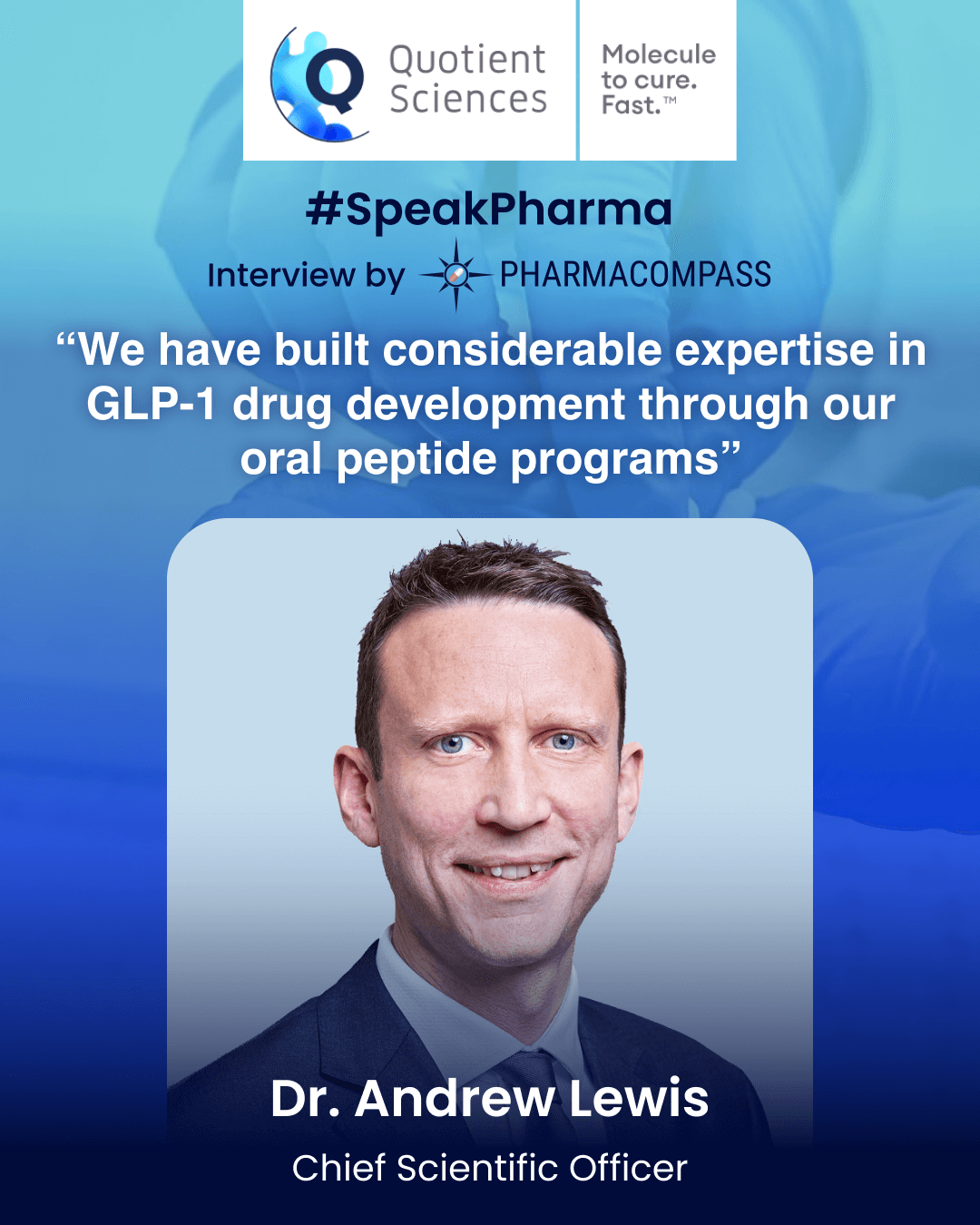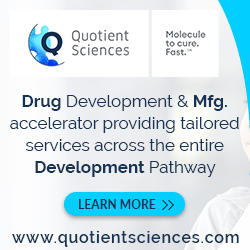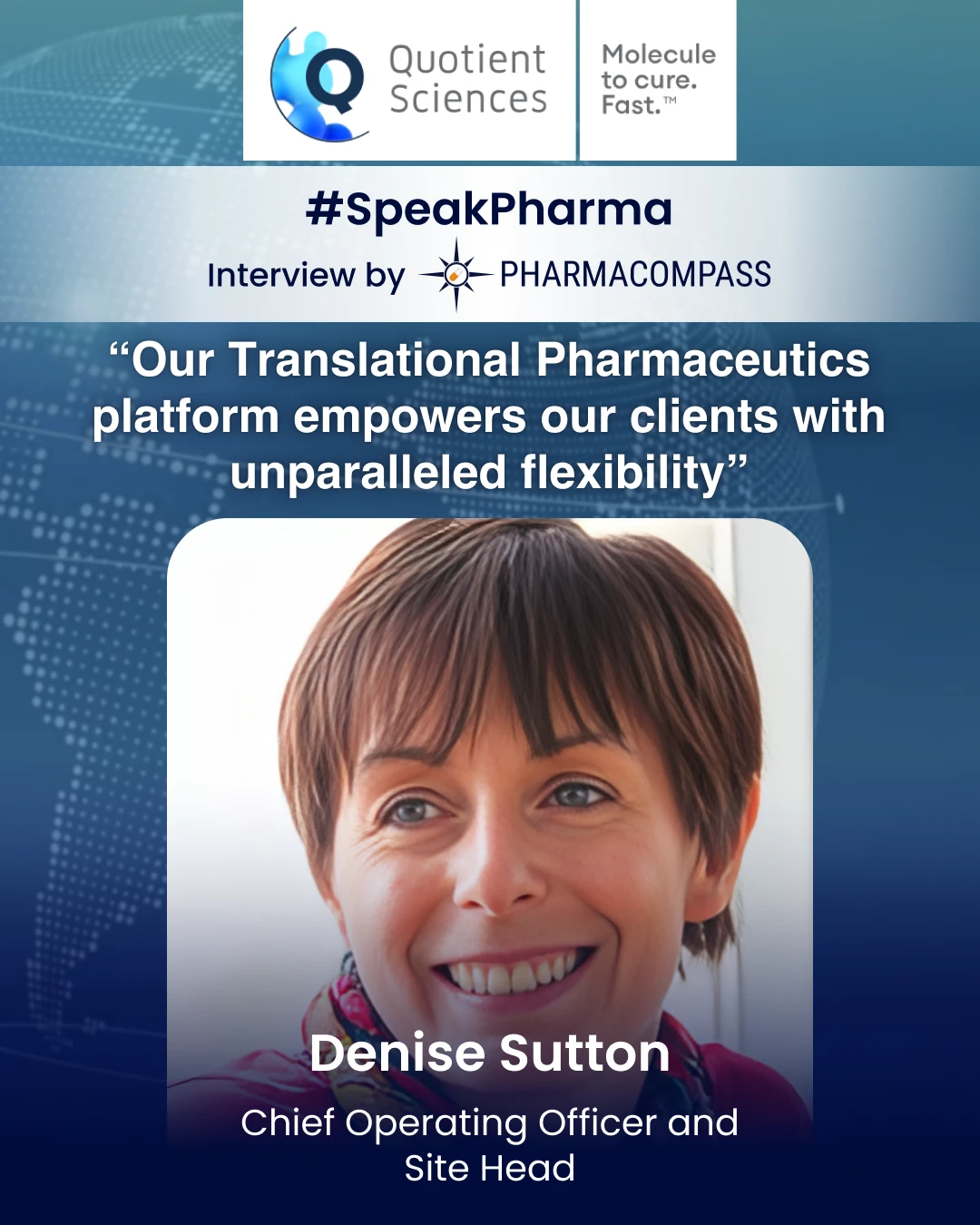
#SpeakPharma with Quotient Sciences
2024-10-14
Impressions: 2517
This week, Speak Pharma interviews Dr. Andrew Lewis, Chief Scientific Officer at Quotient Sciences, a drug development and manufacturing accelerator that offers a range of integrated programs and tailored services to over 550 customers. Lewis discusses the latest developments in the delivery of oral peptides and how Quotient Sciences is helping customers overcome drug development challenges in this exciting space.
HIGHLIGHTS// latest developments in the delivery of oral peptides
Why have glucagon-like peptide-1 (GLP-1) therapies
become essential for treating type 2 diabetes and obesity? What makes the oral delivery
of peptides such as GLP-1 challenging?
GLP-1 and gastric inhibitory polypeptide (GIP) are essential incretin hormones involved in regulating glucose metabolism. Both are produced in the gastrointestinal (GI) tract in response to food intake, specifically glucose and fats.
GLP-1 enhances insulin secretion from the pancreas, but only in response to elevated blood glucose levels. GIP has overlapping effects that are slightly contradictory – it promotes the production of glucagon, which can counteract its glucose-lowering effects.
In people with type 2 diabetes, the body’s response to incretin hormones is impaired. However, the GLP-1 pathway remains relatively intact, allowing it to still stimulate insulin production. There is a more significant impairment for GIP, making it not as effective. This makes GLP-1 a more attractive target for treatment, leading to the development of several GLP-1 receptor agonists for managing type 2 diabetes, obesity, and potentially other conditions.
Incretin analogs, like GLP-1 agonists, have traditionally been challenging to deliver orally. As a result, these medications are most often given by injection. But we know that patients generally prefer taking a tablet or capsule treatment rather than an injection.
Peptides such as GLP-1 analogs go through a challenging journey before being absorbed. This is because the gastrointestinal tract functions to digest these into either small amino acids or very short pieces of polypeptides. Even if they get to the epithelium, they tend to have poor permeability, usually resulting in less than 1 percent bioavailability (the proportion of a drug that enters the circulatory system when introduced into the body, thereby having an active effect).
Various technologies have been developed to overcome bioavailability issues, with permeation enhancers being the most advanced and validated. For example, SNAC is the permeation enhancer used in Novo Nordisk’s oral pill Rybelsus to promote semaglutide absorption.
Mycapssa (octreotide capsules), marketed by Chiesi, employs the Transient Permeation Enhancer (TPE) technology, which utilizes the medium-chain fatty acid (MCFA) sodium caprylate (C8) to augment the absorption of the somatostatin analog octreotide.
At Quotient Sciences, over the last decade, we’ve worked on over 14 oral peptide programs and tested about a dozen different permeation enhancer combinations with them. Permeation enhancers tend to be required in large amounts in formulations, and many of them are usually waxy materials with poor flow, so the tablet formulation and manufacturing process require extra attention and careful design.
From an analytics perspective, a lot of the standard quality control tests for tablets have been designed for small-molecule drugs and are yet to be optimized for use with peptides.
HIGHLIGHTS// permeation enhancers as the most advanced and validated technology to
overcome bioavailability issues/ worked on over 14 oral peptide programs/
tested about a dozen different permeation enhancer combinations
How does Quotient Sciences handle the transition from pre-clinical to clinical development?
We’ve pioneered an integrated approach through our Translational Pharmaceutics platform for drug development. This platform combines drug product manufacturing with clinical testing in healthy volunteers, allowing us to be incredibly adaptive in our phase I trial design.
Through a tight integration of services, we can manufacture a drug, dose it in healthy volunteers, perform bioanalysis and pharmacokinetic analysis, and use data in real time to inform our next steps. In oral peptide programs, we’ve performed numerous studies where we’ve used this capability to optimize the formulation in response to the clinical data.
Typical variables we’ve evaluated are the dose of the peptide and the levels of a permeation enhancer, allowing us to identify the relationship between them to maximize human bioavailability.
Through our ability to see the full spectrum of data – from preclinical to clinical – for 11 different peptides and 10 different permeation enhancers, we have built up considerable expertise in the development of oral peptide drug products. This allows us to provide a more streamlined drug development process for our clients, as common challenges across programs can be readily overcome.
HIGHLIGHTS// Translational Pharmaceutics platform for drug development/ combine drug
product manufacturing with clinical testing in healthy volunteers/ use data in
real time to inform next steps/ 11 different peptides and 10 different
permeation enhancers
What innovations do you see ahead for oral peptide delivery?
I see a real convergence in advances in peptide drug discovery and engineering, together with advances in drug delivery that are really pushing the field forward. Technologies such as phage display mean that vast libraries of peptides can be screened for properties of interest. These are being applied to design peptides specifically for oral delivery.
From a drug delivery perspective, approaches such as ingestible devices, ionic liquids and various technologies to exploit active uptake mechanisms are showing real promise. One challenge with oral peptide delivery technologies is that their effectiveness can be significantly impacted by food intake. However, I expect that in the coming years, new methods will be developed to mitigate these food-related effects.
I also expect artificial intelligence (AI) to greatly benefit oral peptide delivery. In 2021, the US Food and Drug Administration reported it saw more than 100 drug and biologic application submissions containing elements of AI or machine learning (ML) used in the development process. So three to four years later, that number has likely only increased.
All these developments promise to make oral peptide therapies more effective and convenient for patients in the years to come.
HIGHLIGHTS// phage display to screen vast libraries of peptides for properties of interest/ ingestible devices, ionic liquids and various technologies to exploit active uptake mechanisms/ AI will greatly benefit oral peptide delivery
To learn more about this topic, watch Quotient Sciences’ latest webinar featuring Dr. Andrew Lewis and Dr. Stuart Mair, Chief Medical Officer at Quotient Sciences. Watch it here.





